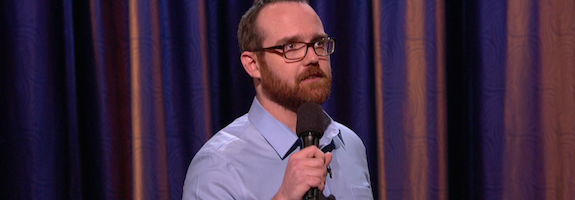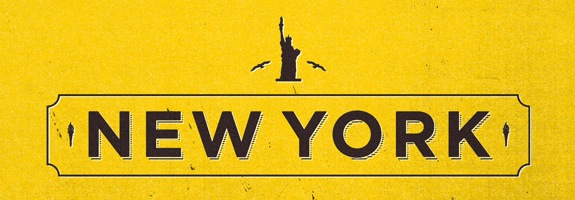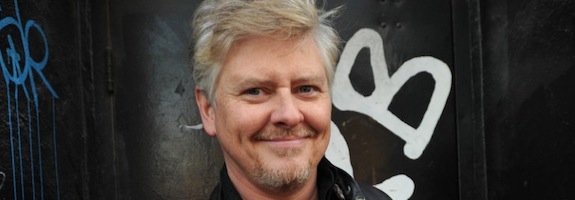This is a guest post from Connected Comedian Andy Sandford, who recently made his first appearance on CONAN. If you’d like to write a guest post for Connected Comedy, please email me.
I recently got to live out a longtime dream of telling my dumb jokes on CONAN.
Any comedian who has achieved some sort of goal or milestone in comedy (big or small) has had another comedian ask them, “How’d you get that?”
The question itself can have a rude connotation. It can be taken as, “How’d YOU get that and not me?” It could also imply that you “got” it, as opposed to having earned it. That being said, I prefer to assume the best intentions behind “How’d you get that?” because I am very aware that comedy is a pursuit which can leave you aimlessly flummoxed, and there is no real guide book (sorry, Judy Carter).
So when Connected Comedy asked if I’d be interested in writing a guest article about the experience, I figured I’d write what I’d want to read about if I was reading this instead of writing it. So I’ll do my best to appease the me that would be reading this.
I have to state, right off the bat, that I am a firm believer in setting realistic career goals that are momentarily just out of reach, then working as hard as possible to get within reach.
I started planning my album months before a label ever talked to me about doing one. In much the same way, I was dead set on doing a late night spot (specifically CONAN) before I knew the circumstances which would lead to that actually happening.
I’m not talking about “The Secret” here, or a magic ability to will dreams into fruition. I’m just talking about stating and then focusing on the thing you want, knowing why you want it, then being prepared for the opportunity when it comes.
Some folks don’t like to hear this, but the one sure-fire way to help yourself reach your comedy goals is to get funnier and hone your craft.
I know that sounds like a no-brainer, but I include it here to point out that it is far and away THE MOST IMPORTANT THING ALWAYS.
I haven’t met a successful/respected comedian yet who wasn’t mostly consumed by the quality of their material. I think that when you first start getting better at comedy, it is easy to get hung up on this notion of a payout timeline. Success in comedy, however you define it, is almost never linear. You can’t expect a consistent return on the time and effort you’ve invested.
All you can do is focus on your act and put yourself in the best position for the things you want.
With that ranting caveat out of the way, I’ll go into specifics…
Not that this is a how-to, but if you’re aspiring to do a late night set you’re going to need to get a good tape at a good show with good audience reaction. The best material can sound like dog shit if there’s no one laughing at it. Even if the booker is great at their job and can tell if someone’s funny regardless, you are making a first impression here.
Different late night bookers prefer different length sets for the initial tape. If you don’t know exactly who’s going to be watching it, six minutes is a pretty safe bet.
As far as the material goes, regardless of your comedic style, the set should reflect who you are and the kind of comedy you do. Also, make sure your opener is bulletproof.
Once you have a tape, the next logical step would be getting it seen by a late night booker. This is obviously where it can get real tricky.
A lot of comedians let the vagueness of all this create a ceiling where they think, “This is the stuff I have to have a manager for.”
Speaking as a comedian who has never signed with any management, you’ll be happy (or depressed) to know that you don’t need a manager to do a late night spot (or a lot of other things). There’s that old showbiz idiom: “Managers get 10% because they do 10% of the work.”
Percentages may change, but that concept is still very true. You are the only one you can count on to care the most about you. So if you don’t have a manager, you’re just going to have to work that much harder and put yourself in the best position you can.
My way of doing that was moving to New York a few years ago. I didn’t even move here because this is one of two industry hubs, but more so because it is the center of the standup universe, with a ton of shows and really good comedians. I found it to be the best option for my personal progression.There’s a million possible paths, and New York was just what felt right for me.
From being in New York, I ended up doing shows with, and eventually opening for, several great comics who I respect very much. In my pursuit of a late night spot, I asked a multiple late night veteran (who is also an insightful person) for advice on getting late night.
Much to my surprise, mid-conversation, they offered to send a tape to the CONAN booker along with a vouch for me.
This is not something you should ask from anyone directly, and if you are in this situation, realize the weight of a respected comic’s word. Don’t be a fucking idiot and phone it in with someone else’s name on the line. It is a very serious thing and it should be taken very seriously. I had to send two tapes to the comic vouching for me before he would send the tape on to the CONAN booker.
After a few weeks, I got a response from the CONAN booker and the notes process began.
The notes process is just what it sounds like. The booker gives you notes on your set and tells you what they like and don’t like. Mostly what they don’t like, but don’t worry, that means they like you (confusing, I know).
This is why I said earlier that having a six-minute tape was a safe bet, even though just about every late night set is five minutes. The bookers are going to do their job, and your set will be vetted pretty thoroughly.
Luckily, the CONAN booker liked most of my jokes from the initial tape, but I still had to make several changes, replace/cut jokes, and send four more tapes over the course of about four months (which meant filming at least a dozen sets, since making a tape in New York is a nightmare).
I’ve never heard of someone sending one tape and then getting handed their late night debut. My point is: Put as much thought into the set as you can, but then be ready to change it.
It may sound tedious (and will lead to ridiculous emails like, “I agree with your note that the shitting thing after the fart story is a bit much”), but the notes process will most likely force you to produce a much tighter and better five minutes than what you initially had in mind.
After the back-and-forth of getting notes and making new tapes, the final set was agreed upon, and I had to make one more tape to show that it was under five minutes. That’s right: UNDER five.
The last tape of my set that I sent clocked in at about 4:50ish. All of this time and material micromanagement is so that there are no doubts about you going waaay over or under when you tape the set for television. The people at CONAN are not as strict on time when it comes to the actual taping because they know they don’t need to be.
As far as the taping itself: yes, it was a little nerve racking – especially the two-minute wait behind a curtain in anticipation for something you’ve dreamt about a million times. At the same time, I knew I was ready and that I was the good kind of nervous.
Comedy is something where you learn not to get too excited about opportunities, because the bottom can drop out at any time (I’ve almost gotten a ton of stuff).
I’ve gotten used to not getting too hyped about things. However, I have to say, when it comes to doing a late night set: it is impossible to build it up too much in your head. It was way more fun than I could have imagined and only reaffirmed the love for what I do, as well as validate my decision to drop out of high school (jk’ing about that. Stay in school kids).
Finally, what has doing late night done for me?
Well, I don’t really know yet fully since I just recently did it. However, I already know not to expect the moon because I was on TV for five minutes. We should all know that’s not how it works.
Comedy is a lot like chess in that you don’t know where your next steps will leave you, but you have to be ready for multiple outcomes, and then outcomes to those outcomes. At the very least, you have to know how the thing you want can be parlayed into furthering your career.
In my case, I book all of my own roadwork, whether in clubs or independent venues. I knew if I could have a good set on a reputable show, it would help immensely with establishing credibility when booking gigs, and especially with independent venues (the very concept of comedy is a hard sell for them sometimes).
Bitter people will say that doing a late night set doesn’t do a fraction of what it used to. That may be true, but I’m not interested in how things used to be, and am already aware that this is a tough business. The returns, or lack of returns, can’t diminish the experience for me.
I always try to create my own returns anyway.
You can watch Andy’s CONAN set below and connect with him on Twitter.




